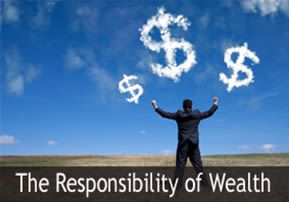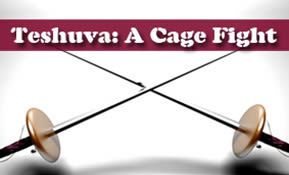
The Responsibility of Wealth
Dovber makes a candid end-of-the-year self assessment, asking himself whether the chunk of wires and metal that he calls his new car makes him a better person or not…

“You think all those rich people started out this way? When they were young and they had nothing, they too would say, ‘when I make my first million, I will give to charity, support Torah institutions, and perform great acts of kindness.’”
Once their dreams come true, the true test of their convictions begin.
It’s easy to make all sorts of pledges while we aspire to possess monetary wealth. It’s only when we actually see the zeros in our accounts pile up does the test begin in earnest. Many good people who promised to do wonderful things for the world once they got rich follow through. Some turn into exactly those whom they resented when they saw them squander their wealth on cars and houses appearing insensitive to all the suffering in the world.
Right before the Jewish People entered the Land of Israel, Moshe Rabbenu tells us that we will be secure in our surroundings. We will have abundance of possessions. We will eat well and be satiated.
 In short, we will be rich.
In short, we will be rich.He also qualifies this blessing with a warning:
…lest you eat and be sated, and build good houses and dwell therein, and your herds and your flocks multiply, and your silver and gold increase, and all that you have increases, and your heart grows haughty, and you forget the Lord, your God, Who has brought you out of the land of Egypt, out of the house of bondage. (Devarim 8:12-14)
The test of our sincerity begins. Will we attribute our wealth to True giver, or not?
After reading the fine print in the Torah it’s easy to make the right choices. But what happens once we are truly put to the test?
I just bought a new car. It seats my family comfortably. It has more seats available for, Bezrat Hashem, the future, and it gets all of us from point A to point B.
It’s also the first time I have ever purchased a new car in my life. From the time I was flipping burgers at 16, to the rental I was driving last month, all of my driving was from second hand vehicles.
Hashem has blessed my family with a generous convenience. I should be humble and grateful for what Hashem has given us. I should thank Him every day. I should be giving friends, family, soldiers, and just about anybody with their thumbs out a ride to wherever they need to go.
This is not the way things are turning out.
Ever since I got this car all I do is look at what other people are driving. I compare what they have to what I have. There is a voice in my head telling me how better a person I am because I have a car that is newer than theirs. Even as I pass people I know to be Torah students, Rabbis, and ba’ale Tshuva, this voice tells me that I stand above them for the three ton bulk of metal and wires I just acquired.
The words of Devarim certainly ring true:
all that you have increases and your heart grows haughty.
All of this foolishness over a car. A car that in a couple of years will look as used as anything I’ve ever driven and as worn as all the others on the lot.
The same mistake we were warned about making while we dwell securely in the Land is the exact same sin I am committing in the very same place, Hashem forgive me.
What do I do? How does one overcome haughtiness?
In Duties of the Heart, we are given proper guidance.
An individual who is ignorant of the ways of the world, and unaware of the signs of wisdom found in it, regards it as his permanent home and place of residence. He invests in it all his efforts and puts his whole heart and all his energies into it, thinking that he furthers his own interests. He does not take into account that the fruit of all his labor and all the property he has amassed will go to others – during his own lifetime and after his death. Thus, he totally neglects his interests in the next world. Duties of the Heart (Gate of Reflection, Ch. 3)
We pursue our “toys” in this life based on the mistaken assumption that we will live forever. Death is something that happens to others. Until it’s your time, in which you are no longer on this earth to reflect upon it, death is always something that happens to someone else.
From the time Moshe Rabbenu warned us about pride in Devarim, there have been billions of men and women, trillions of animals, and quintillions of insects which have inhabited this earth. Over the past three millennia – every one of them has died. This is overwhelming proof that we too will someday perish from this earth.
It’s enough to remind us all that thoughts of pride, arrogance, and insensitivity to others do nothing to better ourselves where it really counts. All the houses, bank accounts, and yes – cars are merely a small convenience and a big test.
When my time comes Hashem won’t ask me how much I paid for my car. He will ask me which acts of kindness I performed while I had it.
We live in a time of relative security and great abundance. The poorest households today have running water, working heat, and electric lights – luxuries not even the greatest royal families could boast just two centuries ago. In terms of human history, we are all being tested with the responsibility of great wealth. Bezrat Hashem, we can conquer our hearts and resist the urge to be haughty. Hashem Willing, we will merit to enjoy the great blessings also included in Sefer Devarim: continued satiety and security in the Land of Israel – and the lifelong opportunity to thank Hashem for all of it!











Tell us what you think!
Thank you for your comment!
It will be published after approval by the Editor.